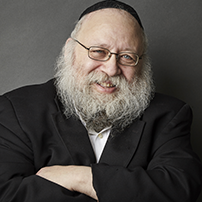
Washing the Hands
SIMPLE REASON
After reciting the Kiddush, we wash our hands before dipping a vegetable in salt water, the next item of the Seder.
The simple reason for the washing of the hands is to comply with a legal opinion that when we moisten a piece of food in water we must first wash our hands. Otherwise, our hands can become susceptible to certain forms of ritual impurity. Although daily normative Jewish practice does not subscribe to this opinion, on the night of Passover we change our customs, to provoke the youngest child’s question: “why are we doing things differently tonight?”
“YOU MIGHT BE HOLY, BUT YOU STILL HAVE TO CLEANSE YOURSELF…”
On the higher spiritual level, we wash our hands now, after reciting the Kiddush prayer, to acknowledge our understanding that notwithstanding our inherent holiness—attained due to G-d taking us out of Egypt and sanctifying us—we must now focus on applying our own effort to cleanse ourselves.
As holy as we may be, we dare not delude ourselves into thinking that we are already so perfect and holy that we need not focus on our imperfections. Our holiness is G-d given; we must now do our part.
KNOWING OUR PLACE
“Who is a wise person?” the Talmudic Sages ask. A traditional answer is, “One, who knows his place.” Just as we must know our faults, we must know our virtues. Conversely, as much as we must know our qualities and strengths, we must not be oblivious to our shortcomings.
SMALL ACHES AND PAINS
While it is true that we are defined—especially on Passover—as essentially holy, this does not preclude the existence of superficial negative elements with which we must deal.
In discussing the current state of the Jewish people, the Rebbe once employed a medical metaphor in which the doctor declares the patient to be essentially healthy, but with some minor aches and pains that must be addressed.
THE LINK
The two first items of the Seder “Kadesh—Sanctify” and “Urchatz—wash” are linked with the conjunctive letter vav, meaning “and.” These are the only two items of the Seder linked in this way. This unique connection underscores how we cannot just recognize our essential holiness without simultaneously realizing that we must also cleanse ourselves of our peripheral impurities.
It is also instructive that this hand washing happens before we dip the vegetable (Karpas) in saltwater. The washing of our hands at this point acts as a protective measure for the act of dipping.
REBELLING: BUT LEAVING OUR EGOS BEHIND
The reason traditionally given for this “dipping” is to do something unusual and different on this night. Passover, paradoxically, is about transcending order even while we are in the midst of the most orderly ritual of Judaism known by the very word for order itself:
Seder!
But before we act “rebelliously” and break our conventional bounds, we must cleanse ourselves of any trace of an egodriven rejection of authority.
There are two diametrically opposite reasons that people rebel. One is ego-driven, and the other aims to drive away the ego. This latter, noble form of rebellion, arises from dissatisfaction with the constraints that stifle a person’s spiritual growth. It represents the desire to break out of the obsession with one’s own ego-driven comfort zone.
We, therefore, must wash our hands, literally and figuratively, to ensure that our motives are pure and that our act of “passing over” is untainted by ego.
CHOCHMA AND BINAH INSEPARABLE
On a deeper Kabbalisitc level, the reason for the vav connecting Kadesh and Urchatz was explained by the Rebbe in the following manner:
These two items correspond to the Divine attributes and their parallel soul faculties of Chochma and Binah, conceptual and developed intellect, respectively. These two attributes are referred to by the Zohar as “two friends that never separate.” For the seminal point of knowledge (Chochma) to become relevant, one must have the capacity to elucidate the concept (Binah), otherwise it remains an abstract idea.
On the other hand, developing, expounding and expanding on an idea by fleshing out its details is only successful when one does not stray from the original concept.
Hence, these two attributes are necessarily intertwined, unlike the distinct emotional traits that can be mutually exclusive. For example: One can be kind and not judgmental. Kindness (chesed) does not lose any of its powerful love force when it is left unchecked by one’s faculty of judgment (gevurah). In contrast, Chochma does suffer, and risks being dissipated, when it is not introduced into Binah; Binah, by itself, goes in the wrong direction when it is not guided by Chochma.
THE CONNECTION
We must try to understand how to connect the two attributes of Chochma and Binah to the two items of Kadesh and Urchatz.
Perhaps the connection is that Kadesh represents opening ourselves to the higher divine forces—the Ein Sof—Infinite light of G-d—that radiate on the night of Passover. The part of our soul that is most receptive to the Infinite is Chochma because of its self-effacing aspect. Its interest lies solely in opening itself up to that which is above it (See, Tanya Chapter 35).
On the other hand, Binah is the process by which we apply our most rigorous tools of analysis. This facility enables that which we have received to flow downward and permeate our entire personality. Without the analytical faculty of Binah, our faculties and senses are not capable of retaining the powerful light of Chochma. Chochma on its own is either too abstract and distant or too powerful and overwhelming for us to retain it unassisted. Binah tempers the intensity of Chochma and enables it to effect change in us.
Urchatz is the process by which we allow the G-dly light that the Chochma of our soul accessed (Kadesh) to flow downward and spread throughout our entire personality and, thereby, cleanse us. It has this capacity only as long as it is connected to the much holier power of Chochma.
Our down-to-earth lesson from this is that we all have noble goals and aspirations. We must apply all of our energies to implement these lofty goals. In so doing, however, we can become so engrossed in and obsessed with the process that we lose the altruistic and noble vision we had at the beginning.
By analogy, it is like people who are so captivated by the scenery on a trip that they forget their original purpose and veer off course.
The inextricable bonds between Kadesh and Urchatz, and Chochma and Binah guarantee that we will not deviate from our singular purpose: marching towards the ultimate Redemption.


